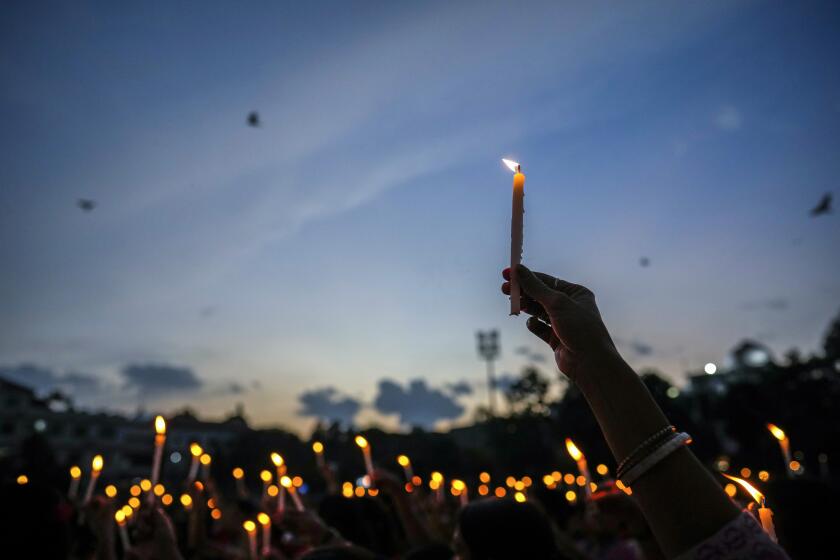‘JihadJane’ indictment alleges threat from within U.S.
Using e-mail, YouTube videos, phony travel documents and a burning desire to kill “or die trying,” a middle-aged American woman from Pennsylvania helped recruit a network for suicide attacks and other terrorist strikes in Europe and Asia, according to a federal grand jury indictment unsealed Tuesday.
Colleen R. LaRose, who dubbed herself “JihadJane,” was so intent on waging jihad, authorities said, that she traveled to Sweden to kill an artist in a way that would frighten “the whole Kufar [nonbeliever] world.”
With blond hair and green eyes, the 46-year-old woman bragged that she could go anywhere undetected, boasting in one e-mail that it was “an honour & great pleasure to die or kill for” jihad, or holy war, the indictment said.
“Only death will stop me here that I am so close to the target!” she wrote.
The indictment doesn’t say whether the Swede was killed, but LaRose was not charged with murder. Authorities refused to identify the artist or to say whether the case was related to arrests in Ireland earlier Tuesday.
Irish police said they had detained seven people in the southern counties of Waterford and Cork in connection with an alleged plot to kill Swedish cartoonist Lars Vilks, who had depicted the prophet Muhammad with the body of a dog.
In the indictment, authorities said LaRose solicited funds for terrorist organizations, helped arrange phony passports and other travel records, and used the Internet to recruit women to kill in Europe and men in Asia. LaRose was arrested Oct. 15 in Philadelphia.
Federal officials cited her as an example of how terrorists sometimes boldly operate inside the United States, fearless of the world watching them on the Internet.
“A woman from suburban America agreed to carry out murder overseas and to provide material support to terrorists,” said David Kris, assistant attorney general for the Justice Department’s National Security Division. That, he emphasized, “underscores the evolving nature of the threat we face.”
Michael L. Levy, the U.S. attorney in Philadelphia, said the case shows “the use terrorists can and do make” of communicating through e-mails and videos around the world. He called LaRose “yet another very real danger lurking on the Internet.”
The other danger, authorities said, is that radical jihadists are turning to home-grown U.S. citizens to carry out their plots. “Terrorists are looking for Americans to join them in their cause,” Levy said, adding that LaRose “shatters any lingering thought that we can spot a terrorist based on appearance.”
But her possible motivation was not clear Tuesday night.
“She appeared to be one of those people who spend a lot of time online and go to all these radical websites and chat rooms,” said one law enforcement source, who, like others interviewed, requested anonymity when discussing the case.
“If there was some moment in her life that changed her, I don’t know,” another law enforcement source said.
Officials said she began to respond to Internet requests from conspirators abroad and to take a leading role in ongoing plots. They said she stole a U.S. passport and “transferred or attempted to transfer it in an effort to facilitate an act of international terrorism.”
The indictment, which also mentioned but did not identify five unindicted co-conspirators, said that LaRose first came to the attention of the FBI in June 2008 when she posted a comment on YouTube under the user name “JihadJane.” She stated that she was “desperate to do something somehow to help” Muslim people.
By December of that year, she was allegedly e-mailing one of the conspirators about her desire to become a shahed, or martyr.
A second conspirator e-mailed her in January 2009 about a similar commitment, the indictment alleges. “I tried twice but I wasn’t successful . . . [but] I will . . . try until Allah will m[a]ke it easy for me,” the conspirator told LaRose.
By February 2009, the indictment said, LaRose was telling one of the conspirators that her physical appearance would allow her to “blend in with many people,” which “may be a way to achieve what is in my heart.”
In March, a third conspirator, in Asia, invited LaRose to “come here and get the training” so that they can “deal in bombs and explosives effecti[v]ely.” The conspirator told LaRose that she was special because she could “get access to many places” because of her nationality, the indictment says.
One conspirator asked LaRose, also known as “Fatima LaRose,” to “Marry me to get me inside Europe.” She agreed, the indictment says.
She also e-mailed the Swedish Embassy in Washington, asking for instructions on acquiring permanent residency in Sweden. One collaborator allegedly told her: “Go to Sweden . . . find location [of an unidentified Swedish resident] . . . and kill him . . . that is what I say to u.”
LaRose allegedly agreed. “I will make this my goal till I achieve it or die trying,” she e-mailed back. “I agree that it is good I blend in.”
The indictment said LaRose also was involved in soliciting “urgent funds for sisters” overseas. By August of last year, she seemed intent on putting plans into action, according to the indictment. “I will be away from here in a couple days. . . . Then . . . I will get to work on importan[t] matters,” she wrote.
Authorities said she removed and concealed her computer hard drive in her home in Pennsburg, Pa., a rural spot between Philadelphia and Allentown. She left for Europe and joined an online community hosted by the Swedish resident she was believed to be targeting.
Some of her former neighbors in Pennsburg were shocked by the allegations. Others seemed to take them in stride.
“She was the weird, weird, weird lady who lived across the hall,” said Eric R. Newell, 36, who works for a National Football League sports agent. “We always called her the crazy lady.”
His wife, Kristy, recalled that LaRose “talked to her cats all the time.”
The Newells, who moved out of the four-unit building about 18 months ago, said LaRose rarely left her apartment except at night, when she would go drinking and get into fights. They never heard her discuss politics or extremist plots, they said.
“We knew she was crazy,” Newell said. “We never knew she was dangerous.”
A downstairs neighbor, Renee Herbert, said LaRose often had two young children with her and, for a time, lived with a boyfriend and the boyfriend’s ill father.
If convicted of the charges against her, LaRose could face life in prison and a $1-million fine.
Other women caught up in terrorism cases in the U.S. include Lynne F. Stewart, a New York attorney convicted in 2005 of passing prison messages from a radical sheik to his followers on the outside urging violent attacks. And last month Aafia Siddiqui, a Pakistani who lived in Boston but is not a U.S. citizen, was convicted in New York of attempting to kill U.S. military and law enforcement officials.
richard.serrano @latimes.com
Times staff writer Bob Drogin in Washington and Morning Call staff writer Jenna Portnoy in Allentown, Pa., contributed to this report.
More to Read
Sign up for Essential California
The most important California stories and recommendations in your inbox every morning.
You may occasionally receive promotional content from the Los Angeles Times.










